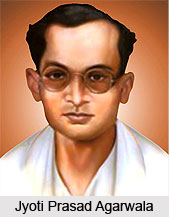 Jyoti Prasad Agarwala was the most celebrated twentieth-century Assamese poet, dramatist, composer, filmmaker, freedom fighter, and visionary, identified with youth, newness, and progressiveness. This famous theatre personality was born in the year of 1903. His death anniversary, 17 January, is a state holiday called Shilpi Diwas or Artists` Day. This day is observed all over Assam. He was a descendant of a Marwari merchant who had made Assam his home, Agarwala ushered modernism into Assamese art, literature, and music.
Jyoti Prasad Agarwala was the most celebrated twentieth-century Assamese poet, dramatist, composer, filmmaker, freedom fighter, and visionary, identified with youth, newness, and progressiveness. This famous theatre personality was born in the year of 1903. His death anniversary, 17 January, is a state holiday called Shilpi Diwas or Artists` Day. This day is observed all over Assam. He was a descendant of a Marwari merchant who had made Assam his home, Agarwala ushered modernism into Assamese art, literature, and music.
He revolutionized playwriting, production, and music in Assamese theatre with his first drama, Shonit Kunwari i.e. `Princess of Shonitpur` in 1925. This drama was staged in 1924. For the first time, a play looked and sounded purely Assamese. The plot, though a well-known myth, was given a dimension and form new for mythological drama. An authentic Assamese atmosphere was created in sets, costumes, properties, songs, and dances. Hitherto songs were either in Hindustani classical or Bengali tunes, but here Agarwala used only Assamese folk and traditional melodies. He also choreographed dances based on native folk and Satriya or Vaishnava monastic forms.
Jyoti Prasad Agarwala had joined Gandhi`s non-violent freedom struggle in 1921. He was imprisoned in 1931-2. This theatre personality was an ardent propagator of artists` commitment to the people. He often talked of revolutionary change. Karengar ligiri or `Palace Maid` in 1937 modernized Assamese theatre in form and content epitomizes this change. Like the two earlier plays, Rupalim in 1960 that was written in 1936 is romantic. He was also an underground leader of the Quit India movement in 1942. Agarwala leaned towards Marxism after Independence. So his next two plays, Khanikar or Artisan, 1939-40 and Lobhita in 1948, are more realistic. The allegorical musical Nimati kanya or `Dumb Girl`, published posthumously in 1964. This was based on folklore, professes that real peace on earth will come only when the reins of power reach the hands of the `artist philosopher Rup Konwar.
Jyoti Prasad Agarwala produced and directed the first Assamese film, Jaymati in 1935. This was cinematized from Lakshminath Bezbaroa`s play Jaymati Kunwari or `Princess Jaymati` in 1915. Jyoti Prasad Agarwala has also composed the lyrics and scores for many songs, of which nearly 300 have been published. Even if nothing else by him survives, this music, known as Jyoti-sangit or `Jyoti`s songs` will survive for many generation. He also made worthwhile contributions to children`s literature and the theory of art. His collected works named Jyotiprasad rachanavali. This rachanavali also contain some English writings as well. Jyoti Prasad Agarwala died of cancer on January 17, 1951 at Tamulbari Tea Estate.